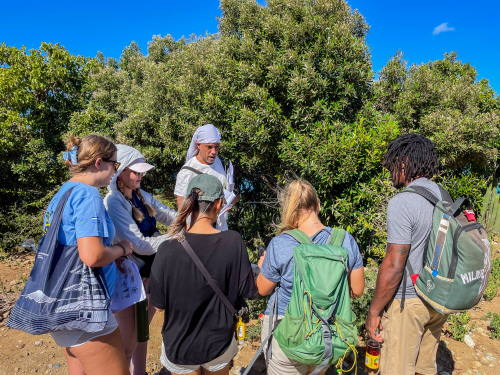 PHILIPSBURG:--- The foundation Environmental Protection in the Caribbean (EPIC) has completed field surveys and training for the terrestrial baseline biodiversity assessment as part of the Coastal Resilience and Needs Assessments (CORENA) project. The objective is to provide information to guide the sustainable management of various habitats in Sint Maarten.
PHILIPSBURG:--- The foundation Environmental Protection in the Caribbean (EPIC) has completed field surveys and training for the terrestrial baseline biodiversity assessment as part of the Coastal Resilience and Needs Assessments (CORENA) project. The objective is to provide information to guide the sustainable management of various habitats in Sint Maarten.
For 12 days, ecologists Mark Yokoyama, a resident of St. Martin, and Kevel Lindsay from Antigua assessed biodiversity in crucial spots of Sint Maarten. Biodiversity is the diversity of species found in an area, an indicator of the excellent health of ecosystems. Plants, insects, mammals, birds, and amphibians were assessed as part of this study. From sunrise to dusk, and with a couple of nighttime explorations, the team conducted an extensive review of plant and animal species found, documenting and taking photographs.
Over 300 species were observed. Mark Yokoyama notes: “Sint Maarten offers a diversity of species, most unknown to the general public, from the smallest insect to larger birds such as Ospreys. We were surprised by the diversity of plants, insects, birds, and animals at almost every site we visited. Most areas that the development has fragmented had pockets of wildlife, including native species such as the yellow sage (Lantana camara) plant and the St. Martin anole (Anolis bogus) lizard.”
Two hands-on training sessions were held for The Nature Foundation staff, including tips on identifying plant species and invertebrates and learning field research methods. A total of seven persons received training. Sabrine Brismeur, Coordinator for the CORENA project at the Nature Foundation, was pleased by both training sessions: “Our staff learned a lot and will be more comfortable in doing future terrestrial assessments to monitor species numbers and the state of their habitat in Sint Maarten.”
Two maps will be produced to show key biodiversity hotspots and recommended areas to protect from human development, further guiding political decisions about sustainable development on Sint Maarten. Based on observations during this assessment, it is clear that bats in Sint Maarten, in particular, are at risk of human impact, and their habitat should remain free of disturbances. Bats play a key role in ecosystems, helping to pollinate plants, disperse seeds, and keep pests in control, such as mosquitos and other insects affecting crops.
The final terrestrial assessment will be completed by April and made available to the public after that time.
The CORENA project was initiated by the Ministry of Public Housing, Spatial Planning, Environment, and Infrastructure (VROMI) and is being executed in partnership with the Nature Foundation. The CORENA project is funded by the European Union through the regional RESEMBID grant program, implemented by Expertise France in 12 overseas countries and territories in the Caribbean.












